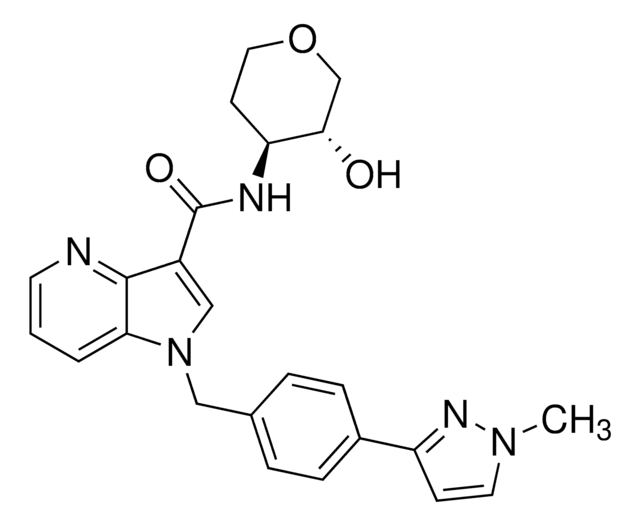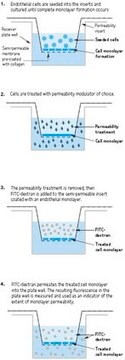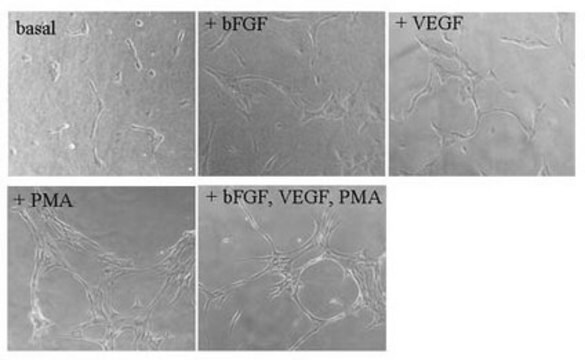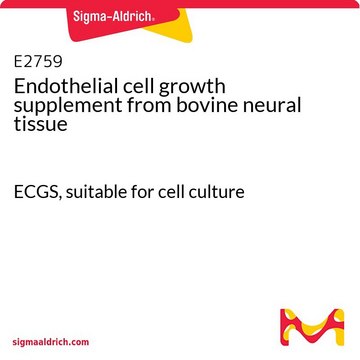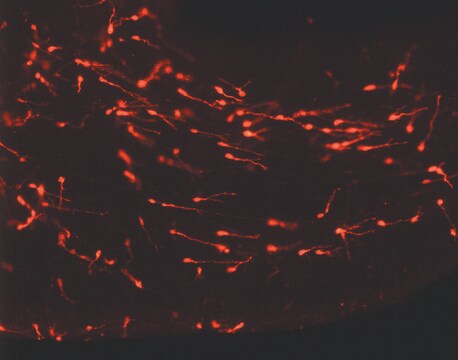SCR023
Endothelial Cell Characterization Kit
Endothelial cell characterization kits enable researchers to characterize cultured endothelial cells in both a constitutive & activated state using basic ICC techniques.
Sinónimos:
Characterization Kit, Endothelial Cell Kit, Kit for Endothelial Characterization
About This Item
Productos recomendados
Quality Level
species reactivity
human
manufacturer/tradename
Chemicon®
technique(s)
cell culture | stem cell: suitable
immunocytochemistry: suitable
input
sample type: mouse embryonic stem cell(s)
sample type neural stem cell(s)
sample type hematopoietic stem cell(s)
sample type epithelial cells
sample type pancreatic stem cell(s)
sample type: human embryonic stem cell(s)
sample type induced pluripotent stem cell(s)
sample type mesenchymal stem cell(s)
sample type cardiac stem cell(s)
shipped in
wet ice
General description
Antibodies for the immunocytochemical characterization of endothelial cells.
Endothelial cells express the following markers constitutively. For optimal results, the following antibody dilutions are recommended for immunocytochemistry:
* Mouse anti-Endothelial Cell (CD146): 1/500 dilution based on 1 mg/mL, final 2 ng/mL
* Rabbit anti-VWF: 1/5000 dilution based on 1 mg/mL, final 0.2 ng/mL
* Mouse anti-CD31: 1/50 dilution based on 0.1 mg/mL, final 20 ng/mL
The following antibodies have been shown to stain cultured HUVEC after 4-6hr of TNF-alpha (100ng/ml) induction at the following dilutions:
* Mouse anti-ICAM-1: 1/500 dilution based on 1 mg/mL, final 2 ng/mL
* Mouse anti-VCAM-1: 1/500 dilution based on 1 mg/mL, final 2 ng/Ml
Application
Stem Cell Research
Components
50 μg of CD31 monoclonal (Part No. 2003788)
10 μg of von Willibrand Factor (vWF) polyclonal (Part No. 2003787)
50 μg of VCAM-1 monoclonal (Part No.MAB2511-50UG)
50 μg of ICAM-1 monoclonal (Part No. 2003785)
100 μg of Mouse control IgG (Part No. PP54-100UG)
100 μg of Rabbit control IgG (Part No. PP64-100UG)
Storage and Stability
Legal Information
Disclaimer
Storage Class
10 - Combustible liquids
Certificados de análisis (COA)
Busque Certificados de análisis (COA) introduciendo el número de lote del producto. Los números de lote se encuentran en la etiqueta del producto después de las palabras «Lot» o «Batch»
¿Ya tiene este producto?
Encuentre la documentación para los productos que ha comprado recientemente en la Biblioteca de documentos.
Nuestro equipo de científicos tiene experiencia en todas las áreas de investigación: Ciencias de la vida, Ciencia de los materiales, Síntesis química, Cromatografía, Analítica y muchas otras.
Póngase en contacto con el Servicio técnico
